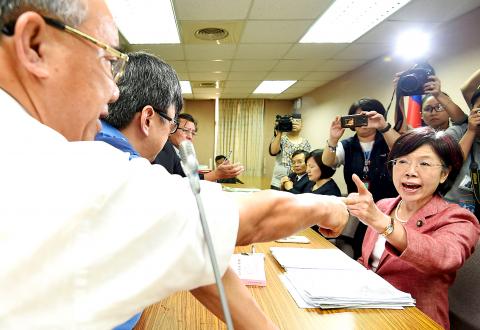Lawmakers on the Judiciary and Organic Laws and Statutes Committee yesterday had a turbulent time as they tried to discuss proposals to amend the Civil Code to legalize same-sex marriage, amid scuffles and protests interrupting the meeting, which finally ended last night with a decision to hold two open hearings next week ahead of a review of the bills.
Democratic Progressive Party (DPP) legislators had planned to review the proposed amendments, but they were blocked by stiff opposition from their Chinese Nationalist Party (KMT) and People First Party (PFP) colleagues.
There was also public pressure on DPP legislators, especially on committee convener Yu Mei-nu (尤美女), as an estimated crowd of 20,000 rallied outside the Legislative Yuan in Taipei to voice their objections to same-sex marriage.

Photo: Chu Pei-hsiung, Taipei Times
The rally was organized by a coalition of religious organizations and civic groups demanding the protection of “traditional family values,” the upholding of Confucian moral ethics and the retention of the legal definition of marriage as the union between a man and a woman.
KMT and PFP legislators trying to stymie a review of the proposed amendments said they were reflecting the majority opinion of the public and that the review procedure had been rushed through and lacked the proper scrutiny and public consultations necessary.
The committee was scheduled to deliberate three different amendments were submitted by DPP, KMT and New Power Party lawmakers.

Photo: Chu Pei-hsiung, Taipei Times
KMT and PFP lawmakers joined forces in an attempt to push through a motion that would see 32 public hearings held nationwide before the proposed amendments could be deliberated by the committee.
However, with Yu presiding over the committee, DPP legislators voted down the motion and Yu announced the session would review the amendments until the end of the day’s session.
Yu’s announcement angered pan-blue camp legislators, with two KMT committee members, Sufin Siluko (廖國棟) and Yosi Takun (孔文吉) pushing their way up to a podium to protest, and engaging in a scuffle with several DPP lawmakers.
Four protesters had tried to enter the committee room during the morning session, shouting: “Legislators are monsters” and “Taiwan will become an AIDS island.”
The four were escorted away by police.
The session resumed with legislators taking turns to question Minister of Justice Chiu Tai-san (邱太三) and other ministry officials, with some calling for a special law on same-sex partnerships and for the Civil Code to remain unaltered.
The committee meeting was disrupted again in the afternoon, when a group of anti-gay marriage protesters stormed into the Legislative Yuan through a side gate, with journalists, police and legislators also converging on the gate.
A number of KMT legislators went to talk to the intruders, who then staged a sit-in outside of the legislative chamber despite efforts by police to remove them.
When the session resumed, the party caucuses negotiated, as KMT and PFP members would not back down from their demands that public hearings be held so that more citizens and civic organizations could give their input.
Later, the parties compromised by agreeing to hold two public hearings in the coming weeks.
“It was regrettable that we encountered such opposition and protests from various groups. After cross-party negotiation, the committee decided to compromise by postponing reviews of the proposed amendments to avert conflicts in society,” Yu said.

Alain Robert, known as the "French Spider-Man," praised Alex Honnold as exceptionally well-prepared after the US climber completed a free solo ascent of Taipei 101 yesterday. Robert said Honnold's ascent of the 508m-tall skyscraper in just more than one-and-a-half hours without using safety ropes or equipment was a remarkable achievement. "This is my life," he said in an interview conducted in French, adding that he liked the feeling of being "on the edge of danger." The 63-year-old Frenchman climbed Taipei 101 using ropes in December 2004, taking about four hours to reach the top. On a one-to-10 scale of difficulty, Robert said Taipei 101

Nipah virus infection is to be officially listed as a category 5 notifiable infectious disease in Taiwan in March, while clinical treatment guidelines are being formulated, the Centers for Disease Control (CDC) said yesterday. With Nipah infections being reported in other countries and considering its relatively high fatality rate, the centers on Jan. 16 announced that it would be listed as a notifiable infectious disease to bolster the nation’s systematic early warning system and increase public awareness, the CDC said. Bangladesh reported four fatal cases last year in separate districts, with three linked to raw date palm sap consumption, CDC Epidemic Intelligence

US climber Alex Honnold left Taiwan this morning a day after completing a free-solo ascent of Taipei 101, a feat that drew cheers from onlookers and gained widespread international attention. Honnold yesterday scaled the 101-story skyscraper without a rope or safety harness. The climb — the highest urban free-solo ascent ever attempted — took just more than 90 minutes and was streamed live on Netflix. It was covered by major international news outlets including CNN, the New York Times, the Guardian and the Wall Street Journal. As Honnold prepared to leave Taiwan today, he attracted a crowd when he and his wife, Sanni,

Taiwanese and US defense groups are collaborating to introduce deployable, semi-autonomous manufacturing systems for drones and components in a boost to the nation’s supply chain resilience. Taiwan’s G-Tech Optroelectronics Corp subsidiary GTOC and the US’ Aerkomm Inc on Friday announced an agreement with fellow US-based Firestorm Lab to adopt the latter’s xCell, a technology featuring 3D printers fitted in 6.1m container units. The systems enable aerial platforms and parts to be produced in high volumes from dispersed nodes capable of rapid redeployment, to minimize the risk of enemy strikes and to meet field requirements, they said. Firestorm chief technology officer Ian Muceus said